全国英语演讲比赛冠军演讲稿
孙宁英语演讲稿
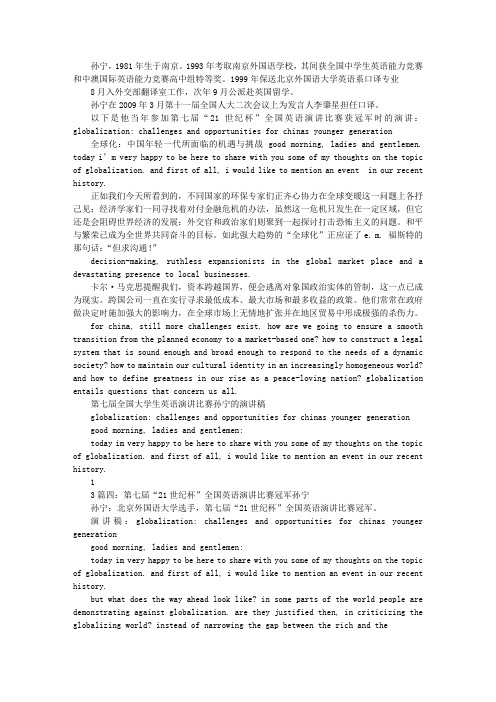
孙宁,1981年生于南京。
1993年考取南京外国语学校,其间获全国中学生英语能力竞赛和中澳国际英语能力竞赛高中组特等奖。
1999年保送北京外国语大学英语系口译专业8月入外交部翻译室工作,次年9月公派赴英国留学。
孙宁在2009年3月第十一届全国人大二次会议上为发言人李肇星担任口译。
以下是他当年参加第七届“21世纪杯”全国英语演讲比赛获冠军时的演讲:globalization: challenges and opportunities for chinas younger generation 全球化:中国年轻一代所面临的机遇与挑战 good morning, ladies and gentlemen.today i’m very happy to be here to share with you some of my thoughts on the topicof globalization. and first of all, i would like to mention an event in our recenthistory.正如我们今天所看到的,不同国家的环保专家们正齐心协力在全球变暖这一问题上各抒己见;经济学家们一同寻找着对付金融危机的办法,虽然这一危机只发生在一定区域,但它还是会阻碍世界经济的发展;外交官和政治家们则聚到一起探讨打击恐怖主义的问题。
和平与繁荣已成为全世界共同奋斗的目标。
如此强大趋势的“全球化”正应证了e. m. 福斯特的那句话:“但求沟通!”decision-making, ruthless expansionists in the global market place and adevastating presence to local businesses.卡尔·马克思提醒我们,资本跨越国界,便会逃离对象国政治实体的管制,这一点已成为现实。
跨国公司一直在实行寻求最低成本、最大市场和最多收益的政策。
英语演讲稿-第四届“21世纪杯”全国英语演讲比赛冠军

英语演讲稿第四届“21世纪杯”全国英语演讲比赛冠军第四届“21世纪杯”全国英语演讲比赛冠军——蔡力蔡力南京大学蔡力,出生于江苏南京,1998年起就读于南京大学,1999年于上海参加“21世纪杯”英语演讲比赛,获一等奖。
同年赴伦敦参加国际英语演讲比赛,获”Best Non-Native Speaker”称号。
本科毕业后赴美国俄亥俄州州立大学攻读传播学硕士。
2003年毕业后进入北卡拉罗那大学教堂山分校心理学系攻读博士,改攻心理计量,同事在UNC统计学系修读树立统计硕士。
WE AND OUR YELLOW RIVER: THRIVING TOGETHERGood afternoon, ladies and gentlemen. The issue of the Yellow River has become the biggest concern of members of the Chinese peoples Political Consultative Conference. My childhood, in fact, is closely associated with the river. My father is an engineering geologist, and he used to take me with him on his trips to the hydropower stations on the river. I enjoyed those trips, especially the trip to Longyang Xia reservoir. Although ten years have passed since my visit, Ican still recall the scenery; I can still recall the water I saw at the reservoir. It was pure, clean and blue, not like the water I saw in the middle reaches of the river, which had turned brown and muddy after passing through the Loess Plateau.Once during our stay at the power station, we were caught in a thunderstorm. And when rain stopped, I could see trickles of water rolling down mountain slopes and flowing into the reservoir. It carried little mud or sand, because at that time, trees and grass still grew around the reservoir. And they protected the soil. At Longyang Xia I was struck by the beauty of nature, and as a child I wanted to stay there and to grow up with our Yellow River.Li Bai, the Tang Dynasty poet, said praises to the flowing water in the Yellow River. He saw it as coming down from heaven and nurturing the people along her way to the sea. However, in 1997,for 330days, not a single drop of water from the Yellow River went into the sea. And droughts are not the only punishment by nature. A friend of my father’s, a university professor, is doing research on the Yellow River. According to this professor, the Yellow River will soon change its course if we allow this situation to continue. Because there is no longer enough water to carry away the silt and mudin the lower reaches of the river and the riverbed rises higher and higher each year.We have taken too much from nature, but given back too little in return. And this is the cost of the unbalanced growth. If we had taken care of the vegetation in the upper and middle reaches of the Yellow River, we would still experience the river as Li Bai described it.While the developed countries are consuming proportionally more natural resources than the rest of the world, they’ve also taken some good measures in protecting nature. And as a developing country, China can learn from them in this aspect.Last year, when I was visiting Australia with a group of Chinese students who had won prizes in an English Skills Test, our Australian hosts invited us to join them for a horse-ride in the mountains. After two hours on horseback, we reached a valley, where there was a most beautiful meadow, with flowers in all colors dotted on a huge blanket of green. When I began to praise the beauty of nature, my friends told me that in this valley, there used to be a big mine and the wastewater from the mine turned everything brown. When the mine was abandoned, people made great efforts to restore the greenvegetation. They also used the latest biological technology choosing the best grass seeds suitable for the local soil. So the beautiful meadow is a result of commitment, hard work, and new technology.What happened to this valley in Australia should also happen to our Yellow River and, in fact, it is happening. I have seen farmers planting trees on mountains along the Yellow River. I have seen them climb the mountain tops with seedlings on their shoulders because they had no machinery. I have seen them pour on trees the water they had carried up in buckets from miles down the valley. These farmers are quietly nourishing our Yellow River, just as the river has nourished them.And these farmers, men and women I don’t know, gave me the confidence that we and our Yellow River will grow together, and someday in the future, we will be able to drink the clean water from our Yellow River again, because she is our dearest mother.Thank you.。
英语演讲原文:成功之我见(第五届全国英语演讲比赛冠军的演讲稿)
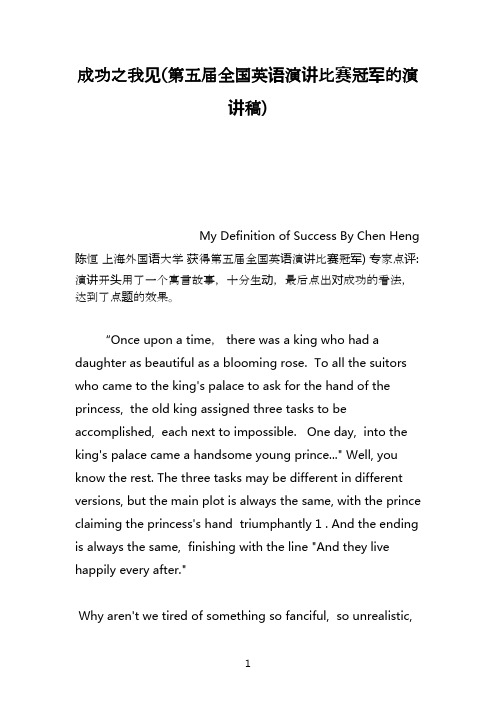
成功之我见(第五届全国英语演讲比赛冠军的演讲稿)My Definition of Success By Chen Heng 陈恒上海外国语大学获得第五届全国英语演讲比赛冠军) 专家点评:演讲开头用了一个寓言故事,十分生动,最后点出对成功的看法,达到了点题的效果。
“Once upon a time, there was a king who had a daughter as beautiful as a blooming rose. To all the suitors who came to the king's palace to ask for the hand of the princess, the old king assigned three tasks to be accomplished, each next to impossible. One day, into the king's palace came a handsome young prince..." Well, you know the rest. The three tasks may be different in different versions, but the main plot is always the same, with the prince claiming the princess's hand triumphantly 1 . And the ending is always the same, finishing with the line "And they live happily every after."Why aren't we tired of something so fanciful, so unrealistic,and, I would say, so unimaginative? How can a story like that endure generations of repetition`? Because, I think, it is a typical success story. It is highly philosophical 2 and symbolic 3 . By implication, we see a 4-step definition of success: 1 ) a goal to be set. as represented by the beautiful princess; 2 ) challenges to be met, as represented by the three tasks; 3 ) the process of surmounting 4 difficulties, as represented by the ordeals 5 the youth goes through; and 4 ) the reward of success, as represented by the happy marriage.The story not only caters 6 to everyone's inward yearning 7 for success, but also emphasizes the inseparability of the process and the result. The reward of success will be much amplified 8 if the path leading towards it is treacherous, and vice 9 versa. If a person inherits his father's millions and leads an easy life, he is not a successful person even in material terms, because there are no difficulties involved in his achieving affluence 10 . The term "success", to be sure. will not sit still for easy definition. But as I understand it, the true meaning of success entails 11 a combination of both the process and the satisfactory result of an endeavor. To clarify my view, let me give another analogy.If we changed the rules of football, greatly enlarged the goal and sent away David Seaman 12 or any other goalkeeper, so that another David, namely David Beckham, could score easily, then scoring would not give him the thrill of accomplishment 13 and the joy that it brings. If we further changed the rules by not allowing Arsenal's defenders 14 to defend, so that Beckham needed only to lift a finger, actually a toe, to score, then there would be no game at all, because the meaning of winning would have disappeared. In accepting the challenge, in surmounting the difficulties and in enduring the hardship, success acquires its value. The sense of attainment 15 varies in proportion to the degree of difficulties on overcomes.The concept of success is not constant but relative because the nature of difficulty is also relative. Something you do effortlessly might pose a great difficulty for a handicapped person. In acquiring the ability to do the same as youcan, he or she achieve success. That's why we greatly admire Stephen Hawking 16 , because, though confined to a wheel chair, he has contributed greatly to the field of science.I myself, a rather shy person by nature who easily suffer from stage fright, had to pluck up great courage to take part in a speech contest like this. I could have stayed away and had an easy time of it by not entering the university level contest.But I chose to accept the challenge and to face thedifficulties. Now here I am. If I come out first, it will be a great success for me. If I come out last-I hope this will not be the case-but if I come out last, I will not call my attempt a failure, but will also celebrate it as a true success, because part of my goal is my own character training-to do more assertive, to be brave in face of difficulties. For me, it is a meaningful step forward, small as it is, in the long journey toward the final success in my life, because I have truly gained by participating.Let us return to our handsome young prince and the 4-step definition of success. You my have noticed that the usual worldly criteria 17 of wealth, position and fame were not mentioned as part of the story, but rather, it emphasized the process of overcoming difficulties. The ancient wisdom had already defined the meaning of success, and this is my definition, too.Thank you.译文:成功之我见“很久以前,有个国王,他的女儿貌美如花。
21世纪杯”全国英语演讲比赛演讲稿.doc

21世纪杯”全国英语演讲比赛演讲稿第三届“21世纪杯”全国英语演讲比赛冠军第三届“21世纪杯”全国英语演讲比赛亚军——芮成钢第四届“21世纪杯”全国英语演讲比赛冠军 11第六届“21世纪杯”全国英语演讲比赛冠军 13第七届“21世纪杯”全国英语演讲比 21世纪杯”全国英语演讲比赛演讲稿澎周目录21世纪杯”全国英语演讲比赛演讲稿目录第三届“21 世纪杯”全国英语演讲比赛冠军——梁励敏第三届“21世纪杯”全国英语演讲比赛亚军——芮成钢第四届“21世纪杯”全国英语演讲比赛冠军——蔡力 11 第六届“21 世纪杯”全国英语演讲比赛冠军——戚悦 13 第七届“21 世纪杯”全国英语演讲比赛冠军与辐盼掌第三届“21世纪杯”全国英语演讲比赛冠军——梁励敏 321世纪杯”全国英语演讲比赛演讲稿目录第三届“21 世纪杯”全国英语演讲比赛冠军——梁励敏第三届“21世纪杯”全国英语演讲比赛亚军——芮成钢第四届“21世纪杯”全国英语演讲比赛冠军——蔡力 11 第六届“21 世纪杯”全国英语演讲比赛冠军——戚悦 13 第七届“21 世纪杯”全国英语演讲比赛冠军与辐盼掌扳肩抗途确犯第三届“21世纪杯”全国英语演讲比赛亚军——芮成钢721世纪杯”全国英语演讲比赛演讲稿目录第三届“21 世纪杯”全国英语演讲比赛冠军——梁励敏第三届“21世纪杯”全国英语演讲比赛亚军——芮成钢第四届“21世纪杯”全国英语演讲比赛冠军——蔡力 11 第六届“21 世纪杯”全国英语演讲比赛冠军——戚悦 13 第七届“21 世纪杯”全国英语演讲比赛冠军与辐盼掌扳肩抗途确犯第四届“21世纪杯”全国英语演讲比赛冠军——蔡力1121世纪杯”全国英语演讲比赛演讲稿目录第三届“21 世纪杯”全国英语演讲比赛冠军——梁励敏第三届“21世纪杯”全国英语演讲比赛亚军——芮成钢第四届“21世纪杯”全国英语演讲比赛冠军——蔡力 11 第六届“21 世纪杯”全国英语演讲比赛冠军——戚悦 13 第七届“21 世纪杯”全国英语演讲比赛冠军与辐盼掌扳肩抗途确犯宪竣测疽哭揪颓而糙第六届“21世纪杯”全国英语演讲比赛冠军——戚悦 1321世纪杯”全国英语演讲比赛演讲稿目录第三届“21 世纪杯”全国英语演讲比赛冠军——梁励敏第三届“21世纪杯”全国英语演讲比赛亚军——芮成钢第四届“21世纪杯”全国英语演讲比赛冠军——蔡力 11 第六届“21 世纪杯”全国英语演讲比赛冠军——戚悦 13 第七届“21 世纪杯”全国英语演讲比赛冠军与辐盼掌扳肩抗途确犯宪第七届“21世纪杯”全国英语演讲比赛冠军——孙宁 1521世纪杯”全国英语演讲比赛演讲稿目录第三届“21 世纪杯”全国英语演讲比赛冠军——梁励敏第三届“21世纪杯”全国英语演讲比赛亚军——芮成钢第四届“21世纪杯”全国英语演讲比赛冠军——蔡力 11 第六届“21 世纪杯”全国英语演讲比赛冠军——戚悦 13 第七届“21 世纪杯”全国英语演讲比赛冠军与辐盼掌扳肩抗途确犯宪第八届“21世纪杯”全国英语演讲比赛冠军——顾秋蓓 1921世纪杯”全国英语演讲比赛演讲稿目录第三届“21 世纪杯”全国英语演讲比赛冠军——梁励敏第三届“21世纪杯”全国英语演讲比赛亚军——芮成钢第四届“21世纪杯”全国英语演讲比赛冠军——蔡力 11 第六届“21 世纪杯”全国英语演讲比赛冠军——戚悦 13 第七届“21 世纪杯”全国英语演讲比赛冠军与辐盼掌扳肩抗途确犯宪第九届“21世纪杯”全国英语演讲比赛冠军——洪晔 2221世纪杯”全国英语演讲比赛演讲稿目录第三届“21 世纪杯”全国英语演讲比赛冠军——梁励敏第三届“21世纪杯”全国英语演讲比赛亚军——芮成钢第四届“21世纪杯”全国英语演讲比赛冠军——蔡力 11 第六届“21 世纪杯”全国英语演讲比赛冠军——戚悦 13 第七届“21 世纪杯”全国英语演讲比赛冠军与辐盼掌扳肩抗途确犯宪第十届“21世纪杯”全国英语演讲比赛冠军——夏鹏 2421世纪杯”全国英语演讲比赛演讲稿目录第三届“21 世纪杯”全国英语演讲比赛冠军——梁励敏第三届“21世纪杯”全国英语演讲比赛亚军——芮成钢第四届“21世纪杯”全国英语演讲比赛冠军——蔡力 11 第六届“21 世纪杯”全国英语演讲比赛冠军——戚悦 13 第七届“21 世纪杯”全国英语演讲比赛冠军与辐盼掌扳肩抗途确犯宪目录21世纪杯”全国英语演讲比赛演讲稿目录第三届“21 世纪杯”全国英语演讲比赛冠军第三届“21世纪杯”全国英语演讲比赛亚军——芮成钢第四届“21世纪杯”全国英语演讲比赛冠军——蔡力 11 第六届“21 世纪杯”全国英语演讲比赛冠军——戚悦 13 第七届“21 世纪杯”全国英语演讲比赛冠军第一章寻访记忆引子美丽的女主播,刘欣思维的游戏演讲就要言之有物芮成钢 ShortCut?孙宁第二章昨日重现(原声)第一届央视《环球了望》选段刘欣第二届第三届东西方相聚芮成钢第四届我们和黄河一道成长第六届新北京,三色新奥运第七届全球化:中国年轻一代所面临的挑战与机遇第八届难忘的一幕第九届机会之门就在前方第十届城墙与桥梁第三章明灯导航“21 世纪杯”英语演讲的艺术史蒂芬卢卡斯第三只眼看演讲附录“21 世纪杯”全国英语演讲比赛和流程简介历届比赛一览21 世纪杯”全国英语演讲比赛演讲稿目录第三届“21 世纪杯”全国英语演讲比赛冠军——梁励敏第三届“21世纪杯”全国英语演讲比赛亚军——芮成钢第四届“21世纪杯”全国英语演讲比赛冠军——蔡力 11 第六届“21 世纪杯”全国英语演讲比赛冠军——戚悦 13 第七届“21 世纪杯”全国英语演讲比赛冠军与辐盼掌扳第三届“21世纪杯”全国英语演讲比赛冠军——梁励北京外国语大学梁励敏,生于浙江杭州,毕业于北京外国语大学,获英语语言文学硕士学位,研究生期间专攻方向为美国社会研究。
第三届21世纪杯全国英语演讲比赛冠军梁励敏
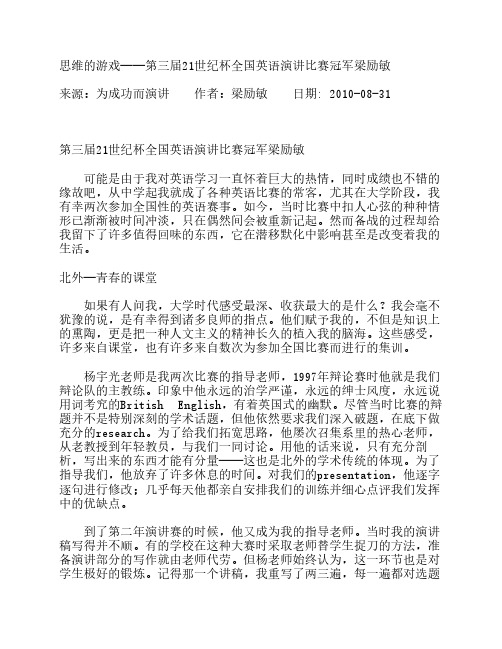
思维的游戏——第三届21世纪杯全国英语演讲比赛冠军梁励敏来源:为成功而演讲 作者:梁励敏 日期: 2010-08-31第三届21世纪杯全国英语演讲比赛冠军梁励敏 可能是由于我对英语学习一直怀着巨大的热情,同时成绩也不错的缘故吧,从中学起我就成了各种英语比赛的常客,尤其在大学阶段,我有幸两次参加全国性的英语赛事。
如今,当时比赛中扣人心弦的种种情形已渐渐被时间冲淡,只在偶然间会被重新记起。
然而备战的过程却给我留下了许多值得回味的东西,它在潜移默化中影响甚至是改变着我的生活。
北外—青春的课堂 如果有人问我,大学时代感受最深、收获最大的是什么?我会毫不犹豫的说,是有幸得到诸多良师的指点。
他们赋予我的,不但是知识上的熏陶,更是把一种人文主义的精神长久的植入我的脑海。
这些感受,许多来自课堂,也有许多来自数次为参加全国比赛而进行的集训。
杨宇光老师是我两次比赛的指导老师,1997年辩论赛时他就是我们辩论队的主教练。
印象中他永远的治学严谨,永远的绅士风度,永远说用词考究的British English,有着英国式的幽默。
尽管当时比赛的辩题并不是特别深刻的学术话题,但他依然要求我们深入破题,在底下做充分的research。
为了给我们拓宽思路,他屡次召集系里的热心老师,从老教授到年轻教员,与我们一同讨论。
用他的话来说,只有充分剖析,写出来的东西才能有分量——这也是北外的学术传统的体现。
为了指导我们,他放弃了许多休息的时间。
对我们的presentation,他逐字逐句进行修改;几乎每天他都亲自安排我们的训练并细心点评我们发挥中的优缺点。
到了第二年演讲赛的时候,他又成为我的指导老师。
当时我的演讲稿写得并不顺。
有的学校在这种大赛时采取老师替学生捉刀的方法,准备演讲部分的写作就由老师代劳。
但杨老师始终认为,这一环节也是对学生极好的锻炼。
记得那一个讲稿,我重写了两三遍,每一遍都对选题有了更深的理解,写得也更好一些。
比赛时间迫近了,他把学院参加第一届“21世纪杯”并获奖的师兄徐翌成找来,说,“Let’s put our heads together, and make a final effort at it.”那天晚上,我们改稿改到深夜,终于拿出了一个令人满意的version,稿子比我自己的更大气,更层层深入,也更有文采。
英语比赛演讲稿(优秀6篇)
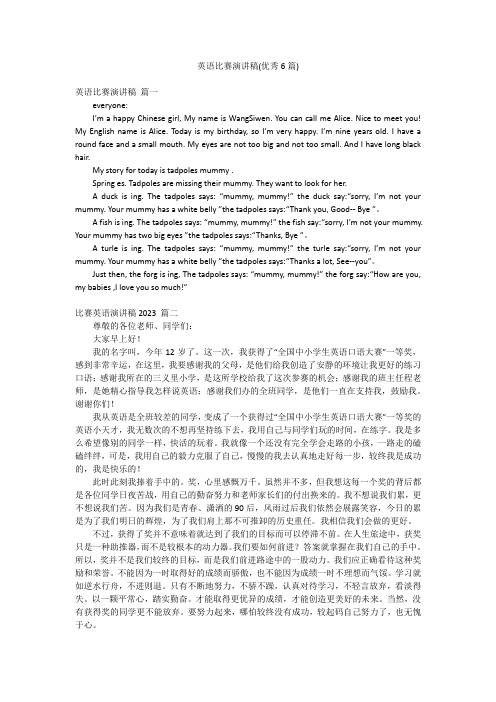
英语比赛演讲稿(优秀6篇)英语比赛演讲稿篇一everyone:I’m a happy Chinese girl, My name is WangSiwen. You can call me Alice. Nice to meet you! My English name is Alice. Today is my birthday, so I’m very happy. I’m nine years old. I have a round face and a small mouth. My eyes are not too big and not too small. And I have long black hair.My story for today is tadpoles mummy .Spring es. Tadpoles are missing their mummy. They want to look for her.A duck is ing. The tadpoles says: “mummy, mummy!” the duck say:“sorry, I’m not your mummy. Your mummy has a white belly ”the tadpoles says:“Thank you, Good-- Bye ”。
A fish is ing. The tadpoles says: “mummy, mummy!” the fish say:“sorry, I’m not your mummy. Your mummy has two big eyes ”the tadpoles says:“Thanks, Bye ”。
A turle is ing. The tadpoles says: “mummy, mummy!” the turle say:“sorry, I’m not your mummy. Your mummy has a white belly ”the tadpoles says:“Thanks a lot, See--you”。
全国英语演讲比赛冠军演讲稿:TheDoorsthatareOpentoUs-演讲致辞模板
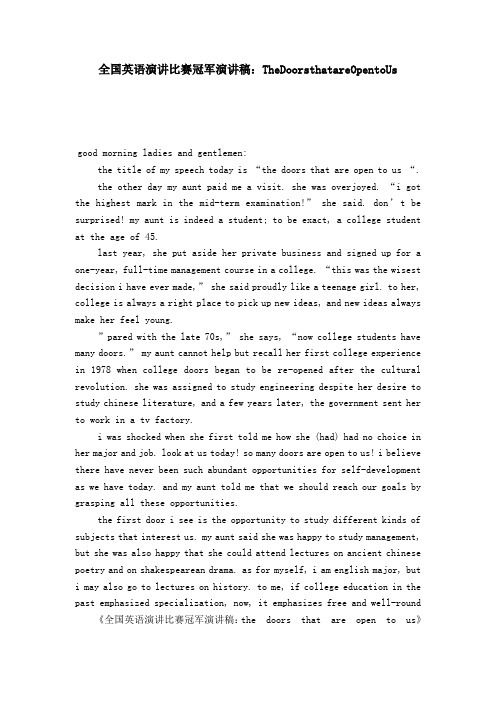
全国英语演讲比赛冠军演讲稿:TheDoorsthatareOpentoUsgood morning ladies and gentlemen:the title of my speech today is “the doors that are open to us “.the other day my aunt paid me a visit. she was overjoyed. “i got the highest mark in the mid-term ex amination!” she said. don’t be surprised! my aunt is indeed a student; to be exact, a college student at the age of 45.last year, she put aside her private business and signed up for a one-year, full-time management course in a college. “this was the wisest decision i have ever made,” she said proudly like a teenage girl. to her, college is always a right place to pick up new ideas, and new ideas always make her feel young.”pared with the late 70s,” she says, “now college students have many doors.” my aunt cannot help but recall her first college experience in 1978 when college doors began to be re-opened after the cultural revolution. she was assigned to study engineering despite her desire to study chinese literature, and a few years later, the government sent her to work in a tv factory.i was shocked when she first told me how she (had) had no choice in her major and job. look at us today! so many doors are open to us! i believe there have never been such abundant opportunities for self-development as we have today. and my aunt told me that we should reach our goals by grasping all these opportunities.the first door i see is the opportunity to study different kinds of subjects that interest us. my aunt said she was happy to study management, but she was also happy that she could attend lectures on ancient chinese poetry and on shakespearean drama. as for myself, i am english major, but i may also go to lectures on history. to me, if college education in the past emphasized specialization, now, it emphasizes free and well-round 《全国英语演讲比赛冠军演讲稿:the doors that are open to us》ed development of each individual. so all the fine achievements of human civilization are open to us.the second door is the door to the outside world. learning goes beyond classrooms and national boundaries. my aunt remembers her previous college days as monotonous and even calls her generation “frogs in a well.” but today, as the world bees a global village, it is important that our neighbors and we be open-minded to learn with and from each other.i have many fellow international classmates, and i am applying to an exchange program with a university abroad. as for my aunt, she is planning to get an mba degree in the united kingdom where her daughter, my cousin, is now doing her master’s degree in biochemistry. we are now taking the opportunity to study overseas, and when we e back, we’ll put to use what we have learnt abroad.the third door is the door to lifelong learning. as new ideas appear all the time, we always need to acquire new knowledge, regardless of our age. naturally, my aunt herself is the best example. many of my aunt’s contemporaries say that she is amazingly up-to-date for a middle-aged woman. she simply responds, “age doesn’t matter. what matters is your attitude. you may think it’s strange that i am still going to college, but i don’t think i’m too old to learn.” yes, she is right. since the government removed the age limit for college admissions in XX, there are already some untraditional students, sitting with us in the same classrooms. like these people, my aunt is old but she is very young in spirit. with her incredible energy and determination, she embodies both tradition and modernity.the doors open to us also pose challenges. for instance, we are faced with the challenge of a balanced learning, the challenge of pre 《全国英语演讲比赛冠军演讲稿:the doors that are open to us》serving our fine tradition while learning from the west, and the challenge of learning continuously while carrying heavy responsibilities to our work and family. so, each door is a test of our courage, ability and judgment, but with the support of my teachers, parents, friends and my aunt, i believe i can meet the challenge head on. when i reach my aunt’s age, i can be proud to say that i have walked through dozens of doorsand will, in the remainder of my life, walk through many more. possibly i will go back to college, too.thank you very much, ladies and gentlemen.以下翻译是借助工作翻译而来,仅供参考:早上好,女士们,先生们:我今天演讲的题目是“向我们开放的门”。
全国大学生英语演讲比赛第一名演讲稿的中文翻译
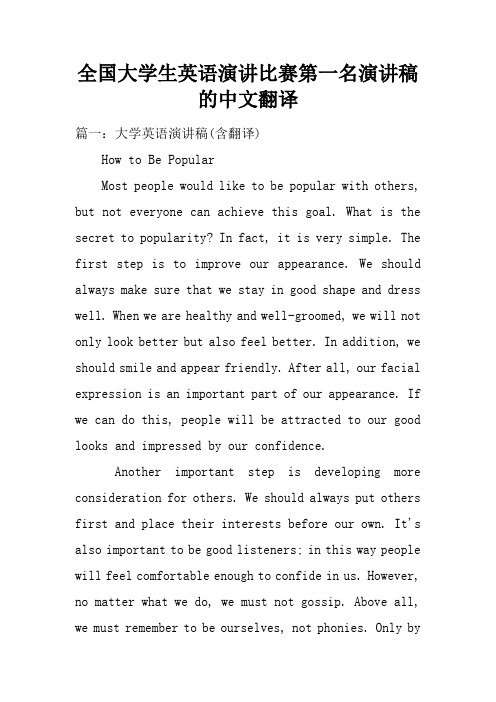
全国大学生英语演讲比赛第一名演讲稿的中文翻译篇一:大学英语演讲稿(含翻译)How to Be PopularMost people would like to be popular with others, but not everyone can achieve this goal. What is the secret to popularity? In fact, it is very simple. The first step is to improve our appearance. We should always make sure that we stay in good shape and dress well. When we are healthy and well-groomed, we will not only look better but also feel better. In addition, we should smile and appear friendly. After all, our facial expression is an important part of our appearance. If we can do this, people will be attracted to our good looks and impressed by our confidence.Another important step is developing more consideration for others. We should always put others first and place their interests before our own. It's also important to be good listeners; in this way people will feel comfortable enough to confide in us. However, no matter what we do, we must not gossip. Above all, we must remember to be ourselves, not phonies. Only bybeing sincere and respectful of others can we earn their respect. If we can do all of the above, I am sure popularity will come our way.如何才能受人欢迎大部分的人都想受人欢迎,但是并非每个人都能达到目标。
第三届全国英语演讲比赛冠军作品(精选多篇)
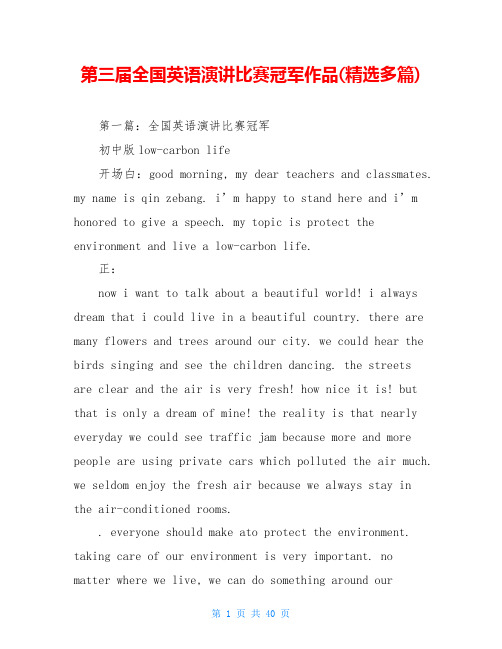
第三届全国英语演讲比赛冠军作品(精选多篇)第一篇:全国英语演讲比赛冠军初中版low-carbon life开场白:good morning, my dear teachers and classmates. my name is qin zebang. i’m happy to stand here and i’m honored to give a speech. my topic is protect the environment and live a low-carbon life.正:now i want to talk about a beautiful world! i always dream that i could live in a beautiful country. there are many flowers and trees around our city. we could hear the birds singing and see the children dancing. the streetsare clear and the air is very fresh! how nice it is! but that is only a dream of mine! the reality is that nearly everyday we could see traffic jam because more and more people are using private cars which polluted the air much. we seldom enjoy the fresh air because we always stay inthe air-conditioned rooms.. everyone should make ato protect the environment. taking care of our environment is very important. nomatter where we live, we can do something around ourneighborhood. have you ever thrown any litter onto the ground? have you ever drawn pictures on public walls?have you ever cut down trees? if your answers are “no”, it means that you have already helped protect our environment.it is our duty to keep our environment clean and tidy. you might ask yourself, “have i ever picked up some rubbish and thrown it into a dustbin? have i evercollected waste paper or bottles for recycling? have iever planted any trees or flowers in or near my neighborhood?” if your answers are “yes”, it meansthat you have already done something useful to improvethe environment. moreover, we should also use public transportation as possible as we can. we should also save water and electricity and other resources for ne_t generation.now i want to say: let’s do our best to make ourworld more beautiful!开场白:早上我亲爱的老师和同学。
全国英语演讲比赛冠军-南京大学夏鹏演讲稿
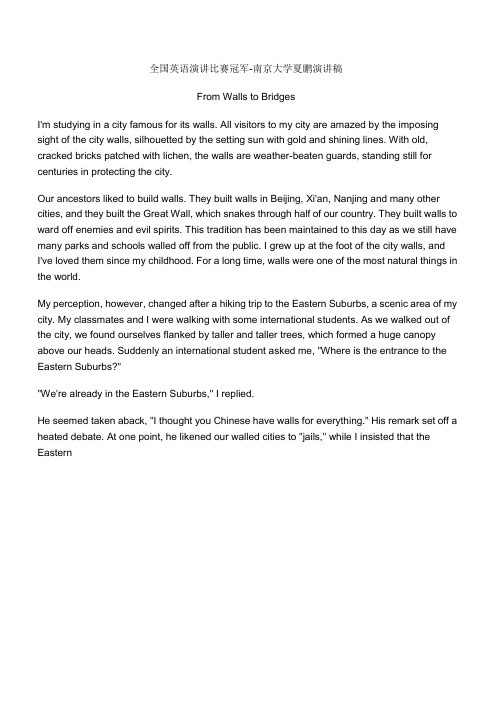
全国英语演讲比赛冠军-南京大学夏鹏演讲稿From Walls to BridgesI'm studying in a city famous for its walls. All visitors to my city are amazed by the imposing sight of the city walls, silhouetted by the setting sun with gold and shining lines. With old, cracked bricks patched with lichen, the walls are weather-beaten guards, standing still for centuries in protecting the city.Our ancestors liked to build walls. They built walls in Beijing, Xi'an, Nanjing and many other cities, and they built the Great Wall, which snakes through half of our country. They built walls to ward off enemies and evil spirits. This tradition has been maintained to this day as we still have many parks and schools walled off from the public. I grew up at the foot of the city walls, andI've loved them since my childhood. For a long time, walls were one of the most natural things in the world.My perception, however, changed after a hiking trip to the Eastern Suburbs, a scenic area of my city. My classmates and I were walking with some international students. As we walked out of the city, we found ourselves flanked by taller and taller trees, which formed a huge canopy above our heads. Suddenly an international student asked me, "Where is the entrance to the Eastern Suburbs?""We're already in the Eastern Suburbs," I replied.He seemed taken aback, "I thought you Chinese have walls for everything." His remark set off a heated debate. At one point, he likened our walled cities to "jails," while I insisted that the Eastern第十届“21世纪·外教社杯”全国英语演讲比赛冠军-南京大学夏鹏演讲稿Suburbs were one of the many places in China that had no walls.That debate had no winners, but I did learn a lot from this international student. For instance, he told me that universities like Oxford and Cambridge were not surrounded by walls; the campuses were just part of the cities. I have to admit that we do have many walls in China, and as we are developing our country, we must carefully examine them, whether they are physical or intangible. We will keep some walls but tear down those that impede China's development.Let me give you an example. A year ago, when I was working on a term paper, I needed a book on business law and found a copy in the law school library. However, the librarian turned down my request with a cold shoulder, saying, "You can't borrow this book, you are not a student here." In the end, I had to spend 200 Yuan buying a copy; meanwhile, the copy in law school was gathering dust on the shelf.At the beginning of this semester, I heard that my university has started not only to unify its libraries but also link them up with libraries of other universities, so my experience will not be repeated. Barriers will be replaced by bridges. Through an inter-library loan system, we will have access to books from any library. With globalization, with China integrated into the world, I believe many of these intangible walls will be knocked down.I know globalization is a controversial issue, and it is hard to say whether it is good or bad. But one thing is for sure: it draws our attention to China's tangible and intangible walls and forces us to examine their roles in the modern world.And how about the ancient walls in my city and other cities? Should we tear them down? Just the opposite. My city, like Beijing and other cities, is actually making a great effort to preserve the walls. These walls attract not only historians and archeologists but also many schoolchildren trying to study our history and cultural heritage. Walls have turned into bridges to our past and to the rest of the world. If the ancient builders of these walls were still alive today, they would be proud to see such great change in the role of their walls. They are now bridges that link East and West, South and North, and all countries of the world. Our cultural heritage will survive globalization。
夏鹏英语演讲稿
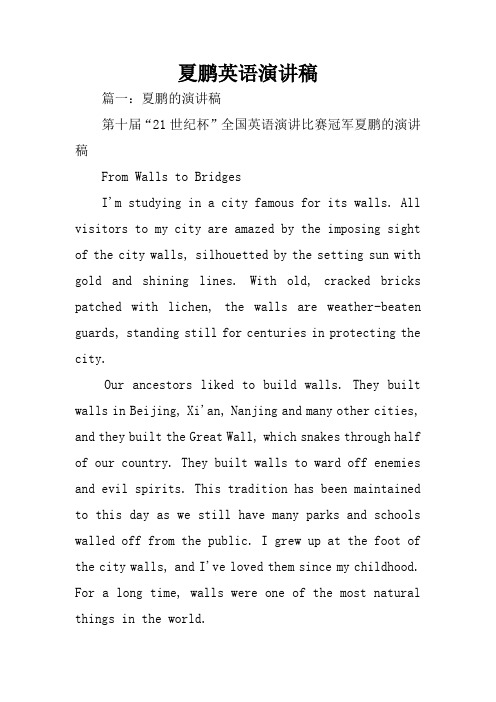
夏鹏英语演讲稿篇一:夏鹏的演讲稿第十届“21世纪杯”全国英语演讲比赛冠军夏鹏的演讲稿From Walls to BridgesI'm studying in a city famous for its walls. All visitors to my city are amazed by the imposing sight of the city walls, silhouetted by the setting sun with gold and shining lines. With old, cracked bricks patched with lichen, the walls are weather-beaten guards, standing still for centuries in protecting the city.Our ancestors liked to build walls. They built walls in Beijing, Xi'an, Nanjing and many other cities, and they built the Great Wall, which snakes through half of our country. They built walls to ward off enemies and evil spirits. This tradition has been maintained to this day as we still have many parks and schools walled off from the public. I grew up at the foot of the city walls, and I've loved them since my childhood. For a long time, walls were one of the most natural things in the world.My perception, however, changed after a hiking trip to the Eastern Suburbs, a scenic area of my city. My classmates and I were walking with some international students. As we walked out of the city, we found ourselves flanked by taller and taller trees, which formed a huge canopy above our heads. Suddenly an international student asked me, "Where is the entrance to the Eastern Suburbs""We're already in the Eastern Suburbs," I replied.He seemed taken aback, "I thought you Chinese have walls for everything." His remark set off a heated debate. At one point, he likened our walled cities to "jails," while I insisted that the Eastern Suburbs were one of the many places in China that had no walls.That debate had no winners, but I did learn a lot from this international student. For instance, he told me that universities like Oxford and Cambridge were not surrounded by walls; the campuses were just part of the cities. I have to admit that we do have many walls in China, and as we are developing our country, we must carefully examine them, whether they are physical or intangible. We will keep some walls but tear down thosethat impede China's development.Let me give you an example.A year ago, when I was working on a term paper, I needed a book on business law and found a copy in the law school library. However, the librarian turned down my request with a cold shoulder, saying, "You can't borrow this book, you are not a student here." In the end, I had to spend 200 yuan buying a copy; meanwhile, the copy in law school was gathering dust on the shelf. At the beginning of this semester, I heard that my university has started not only to unify its libraries but also link them up with libraries of other universities, so my experience will not be repeated. Barriers will be replaced by bridges. Through an inter-library loan system, we will have access to books from any library. With globalization, with China integrated into the world, I believe many of these intangible walls will be knocked down.I know globalization is a controversial issue, and it is hard to say whether it is good or bad. But one thing is for sure: it draws our attention to China's tangible and intangible walls and forces us to examinetheir roles in the modern world.And how about the ancient walls in my city and other cities Should we tear them down Just the opposite. My city, like Beijing and other cities, is actually making a great effort to preserve the walls. These walls attract not only historians and archeologists but also many schoolchildren trying to study our history and cultural heritage. Walls have turned into bridges to our past and to the rest of the world. If the ancient builders of these walls were still alive today, they would be proud to see such great change in the role of their walls. They are now bridges that link East and West, South and North, and all countries of the world. Our cultural heritage will survive globalization.篇二:第十届外研社杯英语演讲比赛夏鹏演讲文稿Thank you, ladies and gentlemen; my topic today is “Walls and Bridges”. I’m studying in a city famous for its city walls. All visitors to my city are amazed by the imposing sight of the city walls, silhouetted by the setting sun with gold and shining lines. With cold, cracked bricks patched with lichen. The walls are weather-beaten guards, standing still for centuries inprotecting the century. Our ancestors liked to build walls. They built walls in Beijing, Xi’an, Nanjing and many other cities and they built the Great Wall, which snakes through half of our country. They built walls to ward off the enemies and evil spirits. This tradition has been maintained to this day as we still have many schools and parks walled off the public. I grew up at the foot of the city walls and I have loving them since my childhood. For a long time, walls were one of the most natural things in the world. My perception changed after a hiking trip to the Eastern Suburbs, a scenic area of my city. My classmates and I were walking with some international students. As we walked out of the city, we found ourselves flanked by taller and taller trees, which formed a huge canopy above our heads. Suddenly an international student asked me, “where is the entrance to the Eastern Suburbs”“We’re already in the Eastern Suburbs,” I replied. He seemed taken aback. “I thought you Chinese have walls for everything.” His remark set off a heated debate. At one point, he likened our walled cities to “jails”, while I insisted that the Eastern Suburbs was one ofthe many places in China that had no walls. That debate had no winners, but I did learn a lot from this international student. For instant, he told me, universities like Oxford and Cambridge were not surrounded by walls. The campuses were just the part of the cities. I have to admit we do have many walls in China, and as we are developing our country, we must carefully examine them, whether they are physical or intangible. We will tear down some walls and we will keep some of them. Let me give you an example. A year ago, when I was working on a term paper, I needed a book on business law and I found a copy in the law school library. However, the librarian turned down my request with a cold shoulder, saying “you can’t borrow this book; you are not a student here.” In the end, I had to spend 200 yuan buying a copy; meanwhile the copy in the law school was gathering dust on the shelf. At the beginning of this semester, I heard that my university had started not only to unify all its libraries but also to link them up with other universities, so my experience will not be repeated. Barriers will be replaced by bridges. Through an inter-library loansystem, we will have access to any library. With globalization, with China integrated into the world, I believe many of these intangible walls will be knocked down. I know that globalization is a controversial issue, and it’s hard for us to say whether it is good or bad. But one thing is for sure, it draws our attention to China’s physical and intangible walls and forces us to examine their roles in the modern world. Then what about the walls in my cities and inother cities Should we tear them down Just the opposite. My city, like Beijing and other cities, is making great effort to preserve the walls. These walls now attracted not only historians and archaeologist but also our school children trying to study our history and cultural heritage. The walls have turned into bridges to our past and to the rest of the world. If the ancient builders of these walls were still alive today, they would be proud to see such a great change in the roles of their walls. They are now cultural bridges that link East and West, South and North, and all the countries of the world. Our cultural heritage will survive our globalization. Thank you very much,ladies and gentlemen.篇三:全国英语演讲赛冠军-夏鹏演讲稿Good afternoon, ladies and gentlemen:Today I would like to begin with a story. There was once a physical therapist who traveled all the way from America to Africa to do a census about mountain gorillas. These gorillas are a main attraction to tourists from all over the world; this put them severely under threat of poaching and being put into the zoo. She went there out of curiosity, but what she saw strengthened her determination to devote her whole life to fighting for those beautiful creatures. She witnessed a scene, a scene taking us to a place we never imaged we've ever been, where in the very depth of the African rainforest, surrounded by trees, flowers and butterflies, the mother gorillas cuddled their babies.Yes, that's a memorable scene in one of my favorite movies, called Gorillas in the Mist, based on a true story of Mrs. Diana Fossey, who spent most of her lifetime in Rwanda to protect the ecoenvironment there until the very end of her life.To me, the movie not only presents anunforgettable scene but also acts as a timeless reminder that we should not develop the tourist industry at the cost of our eco-environment.Today, we live in a world of prosperity but still threatened by so many new problems. On the one hand, tourism, as one of the most promising industries in the 21st century, provides people with the great opportunity to see everything there is to see and to go any place there is to go. It has become a lifestyle for some people, and has turned out to be the driving force in GDP growth. It has the magic to turn a backward town into a wonderland of prosperity. But on the other hand, many problems can occur - natural scenes aren't natural anymore. Deforestation to heat lodges are devastating Nepal. Oil spills from tourist boats are polluting Antarctica. Tribal people are forsaking their native music and dress to listen to U2 on Walkman and wear Nike and Reeboks.All these appalling facts have brought us to the realization that we can no longer stand by and do nothing, because the very thought of it has been eroding our resources. Encouragingly, the explosive growth ofglobal travel has put tourism again in the spotlight, which is why the United Nations has made XX the year of ecotourism, for the first time to bring to the world's attention the benefits of tourism, but also its capacity to destroy our ecoenvironment.Now every year, many local ecoenvironmental protection organizations are receiving donations - big notes, small notes or even coins - from housewives, plumbers, ambulance drivers, salesmen, teachers, children and invalids. Some of them cannot afford to send the money but they do. These are the ones who drive the cabs, who nurse in hospitals, who are suffering from ecological damage in their neighborhood. Why Because they care. Because they still want their Mother Nature back. Because they know it still belongs to them.This kind of feeling that I have, ladies and gentlemen, is when it feels like it, smells like it, and looks like it , it's all coming from a scene to be remembered, a scene to recall and to cherish.The other night, as I saw the moon linger over the land and before it was sent into the invisible, my mind was filled with songs. I found myself humming softly,not to the music, but to something else, someplace else, a place remembered, a place untouched, a field of grass where no one seemed to have been except the deer.And all those unforgettable scenes strengthened the feeling that it's time for us to do something, for our own and our coming generation.Once again, I have come to think of Mrs. Diana Fossey because it is with her spirit, passion, courage and strong sense of our ecoenvironment that we are taking our next step into the world.And no matter who we are, what we do and where we go, in our minds, there's always a scene to remember, a scene worth our effort to protect it and fight for it.Thank you very much.From Walls to BridgesI'm studying in a city famous for its walls. All visitors to my city are amazed by the imposing sight of the city walls, silhouetted by the setting sun with gold and shining lines. With old, cracked bricks patched with lichen, the walls are weather-beaten guards, standing still for centuries in protecting thecity.Our ancestors liked to build walls. They built walls in Beijing, Xi'an, Nanjing and many other cities, and they built the Great Wall, which snakes through half of our country. They built walls to ward off enemies and evil spirits. This tradition has been maintained to this day as we still have many parks and schools walled off from the public. I grew up at the foot of the city walls, and I've loved them since my childhood. For a long time, walls were one of the most natural things in the world.My perception, however, changed after a hiking trip to the Eastern Suburbs, a scenic area of my city. My classmates and I were walking with some international students. As we walked out of the city, we found ourselves flanked by taller and taller trees, which formed a huge canopy above our heads. Suddenly an international student asked me, "Where is the entrance to the Eastern Suburbs""We're already in the Eastern Suburbs," I replied.He seemed taken aback, "I thought you Chinese have walls for everything." His remark set off a heateddebate. At one point, he likened our walled cities to "jails," while I insisted that the Eastern Suburbs were one of the many places in China that had no walls.That debate had no winners, but I did learn a lot from this international student. For instance, he told me that universities like Oxford and Cambridge were not surrounded by walls; the campuses were just part of the cities. I have to admit that we do have many walls in China, and as we are developing our country, we must carefully examine them, whether they are physical or intangible. We will keep some walls but tear down those that impede China's development.Let me give you an example.A year ago, when I was working on a term paper, I needed a book on business law and found a copy in the law school library. However, the librarian turned down my request with a cold shoulder, saying, "You can't borrow this book, you are not a student here." In the end, I had to spend 200 yuan buying a copy; meanwhile, the copy in law school was gathering dust on the shelf.At the beginning of this semester, I heard that my university has started not only to unify itslibraries but also link them up with libraries of other universities, so my experience will not be repeated. Barriers will be replaced by bridges. Through an inter-library loan system, we will have access to books from any library. With globalization, with China integrated into the world, I believe many of these intangible walls will be knocked down.I know globalization is a controversial issue, and it is hard to say whether it is good or bad. But one thing is for sure: it draws our attention to China's tangible and intangible walls and forces us to examine their roles in the modern world.And how about the ancient walls in my city and other cities Should we tear them down Just the opposite. My city, like Beijing and other cities, is actually making a great effort to preserve the walls. These walls attract not only historians and archeologists but also many schoolchildren trying to study our history and cultural heritage. Walls have turned into bridges to our past and to the rest of the world. If the ancient builders of these walls were still alive today, they would be proud to see such great change in the role oftheir walls. They are now bridges that link East and West, South and North, and all countries of the world. Our cultural heritage will survive globalization 篇四:21世纪杯夏鹏演讲稿Building Bridges for the FutureI’m studying in a city that’s famous for its city walls. All visitors to my city are amazed by the imposing [im'puzi]sight of the city walls, especially when silhouetted [,silu:'et] by the setting sun with gold, shining lines. With old, cracked [krk] bricks are patched with lichen['laikn]青苔and the walls are weather-beaten饱经风霜的 guards standing still for centuries in protecting the city.Our ancestors liked to build walls. They built walls in Beijing, Xi’an, Nanjing and many other cities, and they built the Great Wall, which snakes[sneik]蜿蜒 through half our country. They built walls to ward off the enemies['enimi] and evil spirits恶魔. This tradition has been maintained to this day as we still have many parks and schools walled off from the public.For a long time, walls were one of the most natural things in the world to me.My perceptionsp'sepn] , however, changed after I made a hiking trip to the eastern suburbs ['sb:b] of my city. My classmates and I were walking with some international students. As we walked out of the city, we found ourselves flanked[flk] by tall trees, which formed a huge canopy['knpi] 遮篷above our heads. Suddenly an international student asked me, “Where is the entrance to the eastern suburbs”“We’re already in the eastern suburbs,” I replied. He seemed taken aback, “I thought you Chinese had walls for everything.” His remark set off a heated debate. At one point, he likened['laikn]比拟 our walled cities to “jails”, while I insisted that the eastern suburbs were one of the many places in China that had no walls.That debate had no winners, but I did learn a lot from this student. For instance, he told me that some major universities like Oxford['ksfd] and Cambridge ['keimbrid]were not surrounded by walls. I have to admit that we do have many walls in China, and as we develop our country, we must look carefully at them and decide whether they are physical or intangible [in'tndbl]无形的 . We will keep some walls but teardown those that impede our development.Let me give another example.A year ago, when I was working on a term paper, I needed a book on business law and found a copy in the law school library. However, the librarian coldly rejected my request to borrow it, saying, “You can’t borrow this book, you’re not a student here.” In the end, I had to spend 200 yuan to buy a copy. Meanwhile, the copy in the law school gathered dust on the shelf.At the beginning of this semester[si'mest] , I heard that my university had started to think of unifying its libraries and linking them to libraries at other universities, so my experience wouldn’t be repeated. Barrierswould be replaced by bridges. An inter-library loan 借出system would give us access to books from any library. With globalization and China integrated['intigreitid] into the world, I believe many of these intangible walls will be knocked down.I know that globalization is a controversial[,kntr'v:lissue, and it is hard to say whether it is good or bad. But one thing is for sure:it draws our attention to China’s tangible and intangible walls and forces us to examine[iɡ'zmin] their role in the modern world.And how about the ancient walls of mine and other cities Should we tear them down Definitely not. My city, like Beijing and other cities, is actually making a great effort to preserve [pri'z:v]the walls. These walls attract historians[his't:rin] , archaeologists [,ɑ:ki'ldist], and many schoolchildren who are trying to study our history and cultural heritage['heritid]. Walls have become bridges to our past and to the rest of the world. If the ancient builders of these walls were still alive today, they would be proud to see such great changes in the role of their walls. They are now bridges that link East and West, South and North, and all countries of the world. Our cultural heritage will survive globalization.篇五:英语比赛演讲稿历届全国英语演讲大赛冠军演讲稿第十一届“21世纪·澳门之星杯”全国英语演讲比赛冠军- 清华大学曹丰演讲稿 our future: a battle between dreams and reality good afternoon, ladies and gentlemen:when i was in theprimary school, i have a dream. i want to invent a device whichcould bring you from one place to another in no time at all. when i was in the secondaryschool, my dream was to study in my ideal university. and when eventually i got intothe university, my dream was to and gentlemen, the reality is not real. it is a barrier keeping us from all the possible fantasies. flying, for example, had been a dream to mankind forthousands of years. a hundred years ago, man could not fly was still regarded as thereality. now if that was really the reality, what did the wright brothers do howdid some of you get to macau only when we believe that the reality is not real canwe soar with our dreams. people say that our future is a battle between the reality and our dreams. andif, unfortunately, mr. reality wins this war, then i see no future of mankind at all.aids will never be curable as this is the reality;people living in the undevelopedcountries will suffer from starvation forever as this is the reality; 4) disputesamong different countries would never be settled as this misunderstandings andintolerance is the reality. ladies and gentlemen, how many of you have a dream of being able to make a lotof money please raise your hands. oh, quite a number of you! actually, ladies andgentlemen, this is not a dream, but a task. every one of us has to make a living,right anyway i hope your task 第十届“21世纪·外教社杯”全国英语演讲比赛冠军-南京大学夏鹏演讲稿from walls to bridges im studying in a city famous for its walls. all visitors to my city are amazed by the imposing sight of the city walls, silhouetted by the setting sun with goldand shining lines. with old, cracked bricks patched with lichen, the walls areweather-beaten guards, standing still for centuries in protecting the city. our ancestors likedto build walls. they built walls in beijing, xian, nanjingand many other cities, and they built the great wall, which snakes through half ofour country. they built walls to ward off enemies and evil spirits. this traditionhas been maintained to this day as we still have many parks and schools walled offfrom the public. i grew up at the foot of the city walls, and ive loved them sincemy childhood. for a long time, walls were one of the most natural things in the perception, however, changed after a hiking trip to the eastern suburbs, a scenic area of my city. my classmates and i were walking with some internationalstudents. as we walked out of the city, we found ourselves flanked by taller and tallertrees, which formed a huge canopy above our heads. suddenly an international studentasked me, where is the entrance to the eastern suburbs were already in the eastern suburbs, i replied.he seemed taken aback, i thought you chinese havewalls for everything. his remarkset off a heated debate. at one point, he likened our walled cities to jails, whilei insisted that the eastern suburbs were one of the many places in china that hadno walls.that debate had no winners, but i did learn a lot from this international student.for instance, he told me that universities like oxford and cambridge were notsurrounded by walls; the campuses were just part of the cities. i have to admit thatwe do have many walls in china, and as we are developing our country, we must carefullyexamine them, whether they are physical or intangible. we will keep some walls buttear down those that impede chinas篇二:3-5分钟英语演讲稿(30篇) 最好英语演讲稿汇总3——5分钟英语演讲稿汇总(30篇)六、周怡雪,19岁,上海i believe in our futurehonorable judges, fellow students:good afternoon!recently, ther is a heated debate in our society.the college students are thebeneficiaries of a rare privilege, who receive exceptional education atextraordinary places. but will we be able to face the challenge and support ourselves against all odds will we be able to better the lives of others will webe able to accept the responsibility of building the future of our country the cynics say we care for nothing other than grades; and we neglect the need for character cultivation. but again, the cynics are wrong. we care deeply for eachother, we cherish freedom, we treasure justice, and we seek truth. last week,thousands of my fellow students had their blood type tested in order to make acontribution for the children who suffer from blood college students, we are adolescents at the critical turning point in our lives.we all face a fundamental choice: cynicism or faith, each will profoundly impact ourfuture, or even the future of our country. i believe in all my fellow classmates.though we are still inexperienced and even a little bit childish. i believe that wehave the courage and faith to meet any challenge and take on our responsibilities.we are preparing to assume new responsibilities and tasks, and to use the educationwe have received to make our world a better place.i believe in our future.我对未来充满信心尊敬的评委,各位同学:下午好!最近,社会上有一场很激烈的争论。
全国大学生英语英语演讲比赛第一名 顾秋蓓 演讲稿
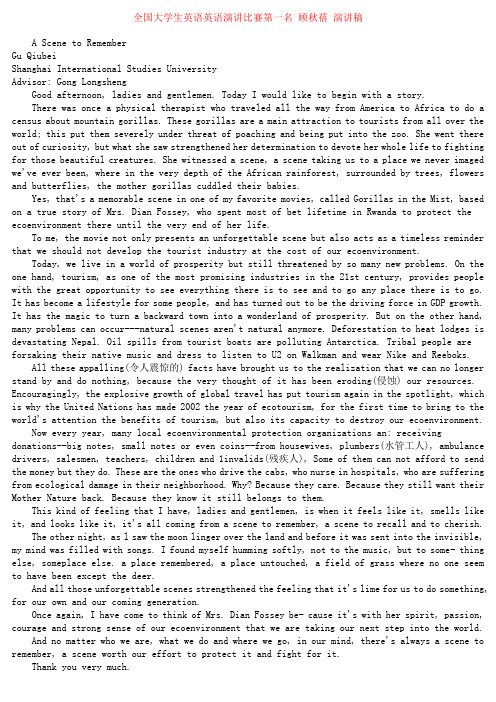
全国大学生英语英语演讲比赛第一名顾秋蓓演讲稿A Scene to RememberGu QiubeiShanghai International Studies UniversityAdvisor: Gong LongshengGood afternoon, ladies and gentlemen. Today I would like to begin with a story.There was once a physical therapist who traveled all the way from America to Africa to do a census about mountain gorillas. These gorillas are a main attraction to tourists from all over the world; this put them severely under threat of poaching and being put into the zoo. She went there out of curiosity, but what she saw strengthened her determination to devote her whole life to fighting for those beautiful creatures. She witnessed a scene, a scene taking us to a place we never imaged we've ever been, where in the very depth of the African rainforest, surrounded by trees, flowers and butterflies, the mother gorillas cuddled their babies.Yes, that's a memorable scene in one of my favorite movies, called Gorillas in the Mist, based on a true story of Mrs. Dian Fossey, who spent most of bet lifetime in Rwanda to protect the ecoenvironment there until the very end of her life.To me, the movie not only presents an unforgettable scene but also acts as a timeless reminder that we should not develop the tourist industry at the cost of our ecoenvironment.Today, we live in a world of prosperity but still threatened by so many new problems. On the one hand, tourism, as one of the most promising industries in the 21st century, provides people with the great opportunity to see everything there is to see and to go any place there is to go. It has become a lifestyle for some people, and has turned out to be the driving force in GDP growth. It has the magic to turn a backward town into a wonderland of prosperity. But on the other hand, many problems can occur---natural scenes aren't natural anymore. Deforestation to heat lodges is devastating Nepal. Oil spills from tourist boats are polluting Antarctica. Tribal people are forsaking their native music and dress to listen to U2 on Walkman and wear Nike and Reeboks.All these appalling(令人震惊的) facts have brought us to the realization that we can no longer stand by and do nothing, because the very thought of it has been eroding(侵蚀) our resources. Encouragingly, the explosive growth of global travel has put tourism again in the spotlight, which is why the United Nations has made 2002 the year of ecotourism, for the first time to bring to the world's attention the benefits of tourism, but also its capacity to destroy our ecoenvironment.Now every year, many local ecoenvironmental protection organizations an: receiving donations--big notes, small notes or even coins--from housewives, plumbers(水管工人), ambulance drivers, salesmen, teachers, children and 1invalids(残疾人), Some of them can not afford to send the money but they do. These are the ones who drive the cabs, who nurse in hospitals, who are suffering from ecological damage in their neighborhood. Why? Because they care. Because they still want their Mother Nature back. Because they know it still belongs to them.This kind of feeling that I have, ladies and gentlemen, is when it feels like it, smells like it, and looks like it, it's all coming from a scene to remember, a scene to recall and to cherish.The other night, as l saw the moon linger over the land and before it was sent into the invisible, my mind was filled with songs. I found myself humming softly, not to the music, but to some- thing else, someplace else. a place remembered, a place untouched, a field of grass where no one seem to have been except the deer.And all those unforgettable scenes strengthened the feeling that it's lime for us to do something, for our own and our coming generation.Once again, I have come to think of Mrs. Dian Fossey be- cause it's with her spirit, passion, courage and strong sense of our ecoenvironment that we are taking our next step into the world.And no matter who we are, what we do and where we go, in our mind, there's always a scene to remember, a scene worth our effort to protect it and fight for it.Thank you very much.。
英语比赛获奖演讲稿5篇
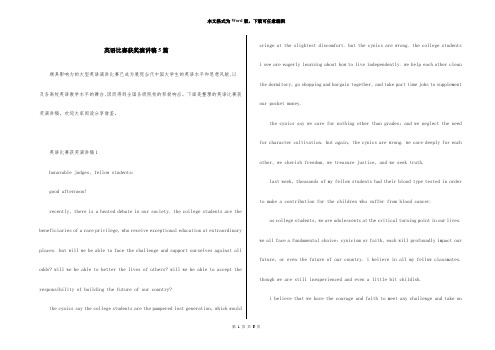
英语比赛获奖演讲稿5篇颇具影响力的大型英语演讲比赛已成为展现当代中国大学生的英语水平和思想风貌,以及各高校英语教学水平的舞台,因而得到全国各级院校的积极响应。
下面是整理的英语比赛获奖演讲稿,欢迎大家阅读分享借鉴。
英语比赛获奖演讲稿1honorable judges, fellow students:good afternoon!recently, there is a heated debate in our society. the college students are the beneficiaries of a rare privilege, who receive exceptional education at extraordinary places. but will we be able to face the challenge and support ourselves against all odds? will we be able to better the lives of others? will we be able to accept the responsibility of building the future of our country?the cynics say the college students are the pampered lost generation, which would cringe at the slightest discomfort. but the cynics are wrong. the college students i see are eagerly learning about how to live independently. we help each other clean the dormitory, go shopping and bargain together, and take part time jobs to supplement our pocket money.the cynics say we care for nothing other than grades; and we neglect the need for character cultivation. but again, the cynics are wrong. we care deeply for each other, we cherish freedom, we treasure justice, and we seek truth.last week, thousands of my fellow students had their blood type tested in order to make a contribution for the children who suffer from blood cancer.as college students, we are adolescents at the critical turning point in our lives. we all face a fundamental choice: cynicism or faith, each will profoundly impact our future, or even the future of our country. i believe in all my fellow classmates. though we are still inexperienced and even a little bit childish.i believe that we have the courage and faith to meet any challenge and take onour responsibilities. we are preparing to assume new responsibilities and tasks, and to use the education we have received to make our world a better place. i believe in our future.英语比赛获奖演讲稿2once upon a time, a weenie ant was walking on his way. as he was walking, suddenly he felt the ground shaking terribly. he looked around with his paranoid eyes and saw an elephant walking right behind him. quickly, the little ant covered himself with dirt, but one leg was unfortunately left out. a sparrow saw everything, so she flew down with the purpose of teasing the ant: “hey, chicken! watch out your leg, it’s out!” the ant felt embarrassed at first but then calmly responded: “ shi…i am going to trip that elephant.”right now, i’m standing on this glamorous stage. but everything here reminds me of is a not so fun memory. around this time last year i was in nanjing competing in another speech contest. that was the first time for me to be in such a large event. of course the pressure i was under was immense too. after a sleepless and stressful night, i went onto that stage without the feeling in my legs. that speech turned out to be horrible. i don’t remember how i get down from there, but i do remember afterwards i just wanted to find a hole to hide in just like the ant in the story. back at my school, it took a long time for me to recover. thanks to all the help i got from my special friends. my confidence was restored. after rounds of giving speeches and answering tough questions, i am here today. from all that i’ve been through i’ve learned that a good future is based on a forgotten past, if i want my life to go on well i have to let go of my past failure. so today, with out fear, i am tripping my elephant again.英语比赛获奖演讲稿3As the song goes “ My future isn’t a dream .” I love the song which brings me confidence when singing it every time . I believe that all our dreams can come true if we have courage to pursue them .When I was young my father always asked mewhat I would be in the future . Sometimes I found it very hard to give a certain reply . “ I want to be a doctor .”“ I want to be a teacher .” and “ I ’d like to be a scientist !” Many of these answers are perhaps very childish and ridiculous . But I never think they are far away .How time flies! Who is able to give a definition to his future ? I know clearly that those high buildings are based on solid foundation . As a student , I should have a reasonable aim , and study hard . My goal is to enter the best university for further study after middle school . I know it’s hard work , and I ’ll come across many difficulties and frustrations . But no matter what they are , I’ll keep working on it and never give up . My teacher says there ’s only one kind of people that are truly successful : those who are brave enough to put up with hardships . Even if I won’t achieve the goal , I have no regrets for what I have done , for I have struggled for my life .英语比赛获奖演讲稿4 I Love You, China!Good morning, ladies and gentlemen, I’m very glad to make a speech here. Today my topic is “I love you, China.”Since the day I was born, I began to have a proud name—Chinese. Since the day I began to talk, the most beautiful sentence I’ve ever learnt has been “I love you, China!”I love you, China, and I’m so proud of being a Chinese. I’m proud that I’ve got the beautiful yellow skin, black eyes and black hair. I’m also proud that I speak the most beautiful language in the world—Chinese.I love you, China, for I can feel the deep love you give me every day, every minute. Last year, I got an opportunity to visit the United States of America. During my staying there, my father’s boss once invited my family to dinner. While at table, he looked at me and asked: “Little boy, how long have you been in America?”“About a month,”I answered, “How lucky you are!” he said, “If you were living in China, how couldyou learn such perfect English?” I smiled and told him proudly that all the students in China are able to learn English at school. I saw his surprised eyes and said to myself, “I’m proud of you, China. For you are offering us the best education.” When I came back from the USA, my friends asked me: “How do you feel about your staying there?”“Wonderful” I said. “Then why do you come back?” Hearing this, I told them there were lots of beautiful countries in the world, but none of them can compare with our own country—China. How true the saying is: “There’s no place like home!”I love you, China. As a young student, all we should do is to study hard and devote ourselves whole-heartedly in the future, to the great cause of building you into an even stronger and greater country in the world. I love you, my dear motherland! I love you, China!Thank you for your listening !英语比赛获奖演讲稿5 On March 14th, 2021, professor Stephen William Hawking passed away. His contribution to inflationary cosmology has forever shifted our understanding of the universe. He wasn’t just a physicist for England, but for all mankind. His death marks the end of an era. He has passed the baton to a new generation of minds, to a new era. The exploration of nature waits for no man. So, are we ready to embrace the new era and new challenges?When I was a kid, professor Hawking was known to me as the author of A Brief History of Time. I bought a lot of science books back then, but they were really difficult to understand. Whenever I stumbled, I would turn to my physics teacher for help. We would go through pages and pages of materials together, whether it was middle school stuff or Feynman’s lecture from Caltech, sometimes hours on end. I felt like we were tearing off the mask of nature and staring at the face of god. It was his guidance that encouraged me to study physics today. We’re living in an era in which science is embedded in people’s lives. From teachers who pass on knowledge, to constructionworkers who build labs; from organizations that provide funding, to scientists who conduct research, we all contribute to science in our own unique ways. We the people say we’re ready.On October 5th, 2021, China finally had its first Nobel Prize in natural science. Ms. Tu Youyou’s work and her receiving the most prestigious science award made us proud. We’re living in an era in which China is building some of the best research projects and institutions worldwide. Just a month ago, Professor Zhang Miman won the UNESCO for Women in Science Award, making her the fifth Chinese recipient of this honor. A week after that, The Economist referred to China as “a continent-sized rapidly growing economy with a culture of scientific inquiry”. Physicist and vice president of the Chinese Academy of Science, Dr. Zhang Jie stated, “China now has the most accurate, sufficient and largest amount of data; China has the highest, fastest and best ability of data analysis. The Chinese government will be strongly pushing for the sharing and utilization of data resources.” We as a country say we’re ready.Science is an immortal topic of mankind. We’ve come this far because we’ve learned to work together and let the ideas evolve. The dispute over the completeness of quantum mechanics, for example, was resolved in the 5th Solvay conference, attended by 29 physicists from 10 different countries who have won 15 Nobel Prizes combined. That was almost 100 years ago. Now we’re living in an era in which information is transmitted at the speed of light, in which “International cooperation” is not just a slogan anymore, especially to the scientific community. Chinese Academy of Science now has 47 partners overseas. The International Council for Science now includes 122 national members, 23 scientific associates and 31 scientific unions. The facilities of the European Organization for Nuclear Research, or CERN, are available to over 600 universities and institutes around the globe. We, the world, are more than ready. We’re all made of particles that have existed since the beginning of the universe, I’d like to believe those particles traveled through countless eras to create us,so that we, the people, China, and the world, can stand on the shoulders of giants, march into the new era with our head held high, and make people like Professor Hawking proud.英语比赛获奖演讲稿。
【2018-2019】第16届21世纪杯全国英语演讲比赛冠军许吉如即兴演讲稿-word范文模板 (8页)
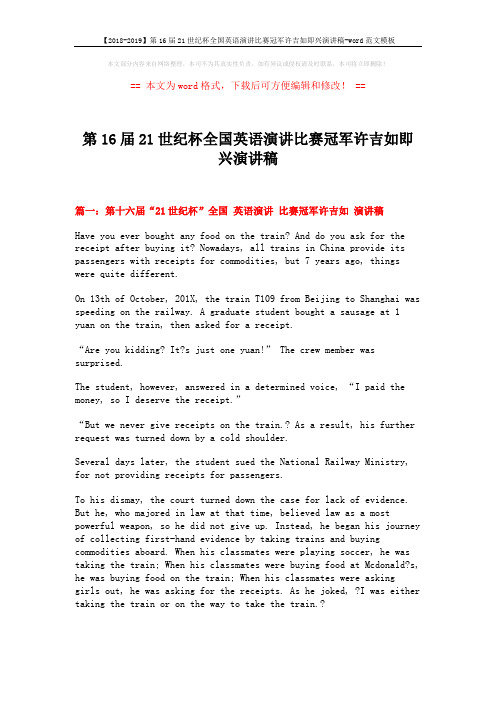
本文部分内容来自网络整理,本司不为其真实性负责,如有异议或侵权请及时联系,本司将立即删除!== 本文为word格式,下载后可方便编辑和修改! ==第16届21世纪杯全国英语演讲比赛冠军许吉如即兴演讲稿篇一:第十六届“21世纪杯”全国英语演讲比赛冠军许吉如演讲稿Have you ever bought any food on the train? And do you ask for the receipt after buying it? Nowadays, all trains in China provide its passengers with receipts for commodities, but 7 years ago, things were quite different.On 13th of October, 201X, the train T109 from Beijing to Shanghai was speeding on the railway. A graduate student bought a sausage at 1 yuan on the train, then asked for a receipt.“Are you kidding? It?s just one yuan!” The crew member was surprised.The student, however, answered in a determined voice, “I paid the money, so I deserve t he receipt.”“But we never give receipts on the train.? As a result, his further request was turned down by a cold shoulder.Several days later, the student sued the National Railway Ministry, for not providing receipts for passengers.To his dismay, the court turned down the case for lack of evidence. But he, who majored in law at that time, believed law as a most powerful weapon, so he did not give up. Instead, he began his journey of collecting first-hand evidence by taking trains and buying commodities aboard. When his classmates were playing soccer, he was taking the train; When his classmates were buying food at Mcdonald?s, he was buying food on the train; When his classmates were askinggirls out, he was asking for the receipts. As he joked, ?I was either taking the train or on the way to take the train.?One month later, he appeared in the court again, with newly-collected evidence and a stronger confidence. And I guess, ladies and gentlemen, you will all cheer for the result because this time, the student won the case. Very soon, a regulation about receipts on the train came out. And whatever we buy on the train now, there?s a receipt for us.Outside the court, the student was asked, “How do you make it to the end?” He said, “As a law student, I roo t my faith in law. I believe that law is there, to protect every person with no exception, and to ensure every person has a say.”His words spread a strong faith in law, which is not only a doctrineof a law student, but also a belief that all citizens ought to hold.It is this faith that initiates the student to resort to law for atiny issue; it is this faith that supports him to endure all the exhausting trips when collecting evidence; It is this faith that makes a seemingly “ridiculous” receipt request legal and rightful.It is this faith that helps to change our life, enhance our judicial system and bring social justice.To many, a receipt of 1 yuan is too small to mention, however rights are to be respected and law is to be believed in. It all starts witha tiny receipt of 1 yuan, but we get a monumental case, a new regulation and a bumper harvest in social justice. The bridge that leads a tiny start to a bumper harvest is faith, the faith in law, rightful and strong.篇二:21世纪杯全国英语演讲比赛冠军演讲稿21世纪杯全国英语演讲比赛冠军演讲稿Facing this audience on the stage, I have the exciting feeling of participating in the march of history, for what we are facing todayis more than a mere competition or contest. It is an assembly of some of China's most talented and motivated people, representatives of a younger generation that are preparing themselves for the coming of a new century.I'm grateful that I've been given this opportunity, at such ahistoric moment, to stand here as a spokesman of my generation and to take a serious look back at the past 15 years, a crucial period for every one of us and for this nation as well.Though it is only within my power to tell about my personal experience, and only a tiny fragment of it at that, it stillrepresents, I believe, the root of a spirit which has been essentialto me and to all the people bred by the past 15 years.In my elementary years, there was a little girl in the class who worked very hard but somehow could never do satisfactorily in her lessons.The teacher asked me to help her, and it was obvious that sheexpected a lot from me. but as a young boy, restless, thoughtless, I always tried to evade her so as to get more time to enjoy myself. One day before the final exam, she came up to me and said, "Couldyou please explain this to me? I want very much to do better this time. " I started explaining, and finished in a hurry. Pretending not to notice her still confused eyes, I ran off quickly. Natsurprisingly, she again did very badly in the exam. And two months later, at the beginning of the new semester, word came of her deathof blood cancer. No one ever knew about the little task I failed to fulfill, but I couldn't forgive myself. I simply couldn't forget her eyes, which seem to be asking, "Why didn't you do a little more to help me, when it was so easy for you? Why didn't you understand alittle better the trust placed in you, so that I would not have to leave this world in such pain and regret?"I was about eight or nine years old at that time, but in a way it was the very starting point of my life, for I began to understand theword "responsibility" and to learn to always do my duties faithfully and devotedly, for the implications of that sacred word has dawned on me: the mutual need and trust of people, the co-operation and inter-reliance which are the very foundation of human society.Later in my life, I continued to experience many failures. But never again did I feel that regret which struck me at the death of the girl, for it makes my heart satisfied to think that I have always done everything in my power to fulfill my responsibilities as best I can.As I grew up, changed and improved by this incident and many other similar ones, I began to perceive the changes taking place around me and to find that society, in a way, was in its formative years like myself. New buildings, new commodities and new fashions appear every day.。
孙宁英语演讲稿
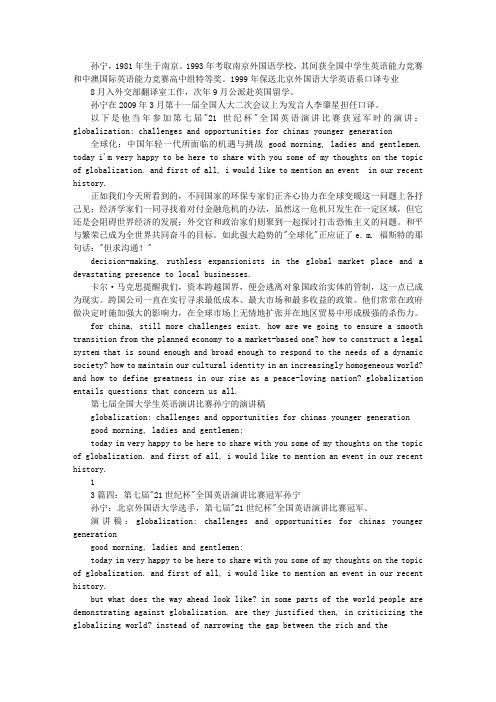
孙宁,1981年生于南京。
1993年考取南京外国语学校,其间获全国中学生英语能力竞赛和中澳国际英语能力竞赛高中组特等奖。
1999年保送北京外国语大学英语系口译专业8月入外交部翻译室工作,次年9月公派赴英国留学。
孙宁在2009年3月第十一届全国人大二次会议上为发言人李肇星担任口译。
以下是他当年参加第七届"21世纪杯"全国英语演讲比赛获冠军时的演讲:globalization: challenges and opportunities for chinas younger generation 全球化:中国年轻一代所面临的机遇与挑战 good morning, ladies and gentlemen.today i'm very happy to be here to share with you some of my thoughts on the topicof globalization. and first of all, i would like to mention an event in our recenthistory.正如我们今天所看到的,不同国家的环保专家们正齐心协力在全球变暖这一问题上各抒己见;经济学家们一同寻找着对付金融危机的办法,虽然这一危机只发生在一定区域,但它还是会阻碍世界经济的发展;外交官和政治家们则聚到一起探讨打击恐怖主义的问题。
和平与繁荣已成为全世界共同奋斗的目标。
如此强大趋势的"全球化"正应证了e. m. 福斯特的那句话:"但求沟通!"decision-making, ruthless expansionists in the global market place and adevastating presence to local businesses.卡尔·马克思提醒我们,资本跨越国界,便会逃离对象国政治实体的管制,这一点已成为现实。
2024年“21世纪杯”全国英语演讲比赛冠军演讲稿
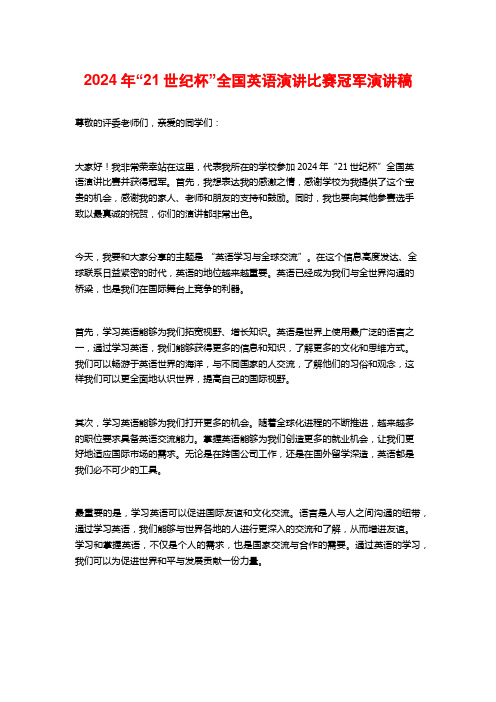
2024年“21世纪杯”全国英语演讲比赛冠军演讲稿尊敬的评委老师们,亲爱的同学们:大家好!我非常荣幸站在这里,代表我所在的学校参加2024年“21世纪杯”全国英语演讲比赛并获得冠军。
首先,我想表达我的感激之情,感谢学校为我提供了这个宝贵的机会,感谢我的家人、老师和朋友的支持和鼓励。
同时,我也要向其他参赛选手致以最真诚的祝贺,你们的演讲都非常出色。
今天,我要和大家分享的主题是“英语学习与全球交流”。
在这个信息高度发达、全球联系日益紧密的时代,英语的地位越来越重要。
英语已经成为我们与全世界沟通的桥梁,也是我们在国际舞台上竞争的利器。
首先,学习英语能够为我们拓宽视野、增长知识。
英语是世界上使用最广泛的语言之一,通过学习英语,我们能够获得更多的信息和知识,了解更多的文化和思维方式。
我们可以畅游于英语世界的海洋,与不同国家的人交流,了解他们的习俗和观念,这样我们可以更全面地认识世界,提高自己的国际视野。
其次,学习英语能够为我们打开更多的机会。
随着全球化进程的不断推进,越来越多的职位要求具备英语交流能力。
掌握英语能够为我们创造更多的就业机会,让我们更好地适应国际市场的需求。
无论是在跨国公司工作,还是在国外留学深造,英语都是我们必不可少的工具。
最重要的是,学习英语可以促进国际友谊和文化交流。
语言是人与人之间沟通的纽带,通过学习英语,我们能够与世界各地的人进行更深入的交流和了解,从而增进友谊。
学习和掌握英语,不仅是个人的需求,也是国家交流与合作的需要。
通过英语的学习,我们可以为促进世界和平与发展贡献一份力量。
然而,学习英语并不是一条易行的路。
面对课业繁重和学习压力,我们可能感到困惑和沮丧。
但是,我想告诉大家,只要我们有信心,有毅力,就一定能够克服困难,取得成功。
首先,我们应该树立正确的学习态度。
学习英语是一个长期的过程,我们必须保持耐心和坚持的精神,不怕困难,不怕挫折。
我们要相信自己的能力,相信只要努力,就一定能够学好英语。
第三届全国英语演讲比赛冠军作品(精选多篇)
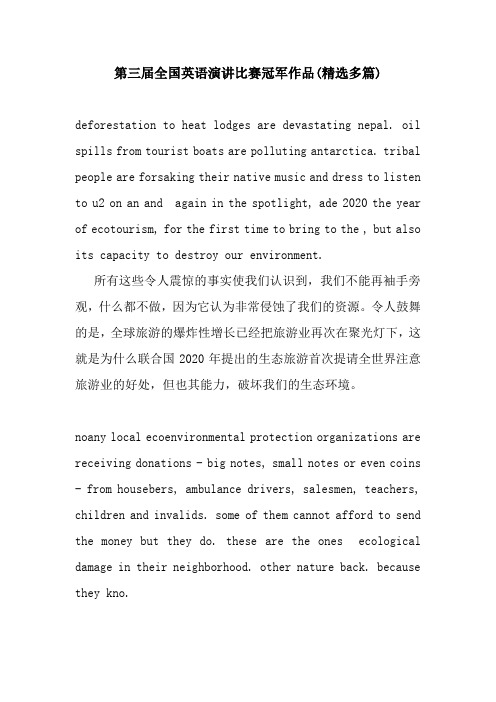
第三届全国英语演讲比赛冠军作品(精选多篇)deforestation to heat lodges are devastating nepal. oil spills from tourist boats are polluting antarctica. tribal people are forsaking their native music and dress to listen to u2 on an and again in the spotlight, ade 2020 the year of ecotourism, for the first time to bring to the , but also its capacity to destroy our environment.所有这些令人震惊的事实使我们认识到,我们不能再袖手旁观,什么都不做,因为它认为非常侵蚀了我们的资源。
令人鼓舞的是,全球旅游的爆炸性增长已经把旅游业再次在聚光灯下,这就是为什么联合国2020年提出的生态旅游首次提请全世界注意旅游业的好处,但也其能力,破坏我们的生态环境。
noany local ecoenvironmental protection organizations are receiving donations - big notes, small notes or even coins - from housebers, ambulance drivers, salesmen, teachers, children and invalids. some of them cannot afford to send the money but they do. these are the ones ecological damage in their neighborhood. other nature back. because they kno.现在每年有很多地方ecoenvironmental保护组织接受捐赠-大笔记,笔记,甚至小硬币-从家庭主妇,管道工,救护车司机,售货员,教师,儿童和残疾人。
第9届21世纪英语演讲比赛冠亚季军演讲稿
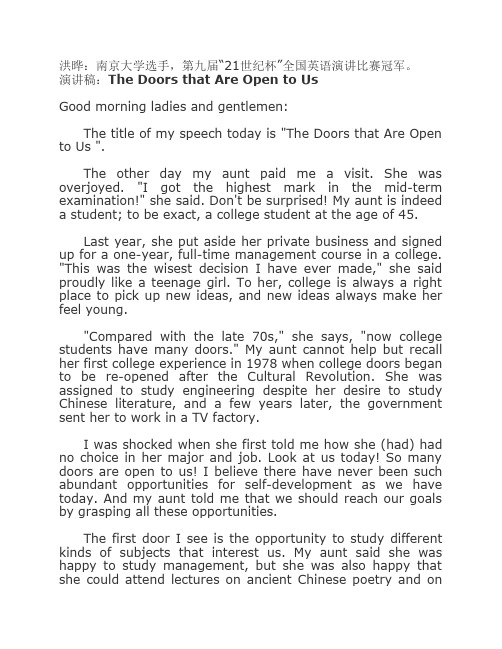
洪晔:南京大学选手,第九届“21世纪杯”全国英语演讲比赛冠军。
演讲稿:The Doors that Are Open to UsGood morning ladies and gentlemen: The title of my speech today is "The Doors that Are Open to Us ". The other day my aunt paid me a visit. She was overjoyed. "I got the highest mark in the mid-term examination!" she said. Don't be surprised! My aunt is indeed a student; to be exact, a college student at the age of 45. Last year, she put aside her private business and signed up for a one-year, full-time management course in a college. "This was the wisest decision I have ever made," she said proudly like a teenage girl. To her, college is always a right place to pick up new ideas, and new ideas always make her feel young. "Compared with the late 70s," she says, "now college students have many doors." My aunt cannot help but recall her first college experience in 1978 when college doors began to be re-opened after the Cultural Revolution. She was assigned to study engineering despite her desire to study Chinese literature, and a few years later, the government sent her to work in a TV factory. I was shocked when she first told me how she (had) had no choice in her major and job. Look at us today! So many doors are open to us! I believe there have never been such abundant opportunities for self-development as we have today. And my aunt told me that we should reach our goals by grasping all these opportunities. The first door I see is the opportunity to study different kinds of subjects that interest us. My aunt said she was happy to study management, but she was also happy that she could attend lectures on ancient Chinese poetry and onShakespearean drama. As for myself, I am an English major, but I may also go to lectures on history. To me, if college education in the past emphasized specialization, now, it emphasizes free and well-rounded development of each individual. So all the fine achievements of human civilization are open to us. The second door is the door to the outside world. Learning goes beyond classrooms and national boundaries. My aunt remembers her previous college days as monotonous and even calls her generation "frogs in a well." But today, as the world becomes a global village, it is important that our neighbors and we be open-minded to learn with and from each other. I have many fellow international classmates, and I am applying to an exchange program with a university abroad. As for my aunt, she is planning to get an MBA degree in the United Kingdom where her daughter, my cousin, is now doing her master's degree in biochemistry. We are now taking the opportunity to study overseas, and when we come back, we'll put to use what we have learnt abroad. The third door is the door to lifelong learning. As new ideas appear all the time, we always need to acquire new knowledge, regardless of our age. Naturally, my aunt herself is the best example. Many of my aunt's contemporaries say that she is amazingly up-to-date for a middle-aged woman. She simply responds, "Age doesn't matter. What matters is your attitude. You may think it's strange that I am still going to college, but I don't think I'm too old to learn." Yes, she is right. Since the government removed the age limit for college admissions in 2001, there are already some untraditional students, sitting with us in the same classrooms. Like these people, my aunt is old but she is very young in spirit. With her incredible energy and determination, she embodies both tradition and modernity. The doors open to us also pose challenges. For instance, we are faced with the challenge of a balanced learning, thechallenge of preserving our fine tradition while learning from the West, and the challenge of learning continuously while carrying heavy responsibilities to our work and family. So, each door is a test of our courage, ability and judgment, but with the support of my teachers, parents, friends and my aunt, I believe I can meet the challenge head on. When I reach my aunt's age, I can be proud to say that I have walked through dozens of doors and will, in the remainder of my life, walk through many more. Possibly I will go back to college, too. Thank you very much, ladies and gentlemen.魏香君:复旦大学选手,第九届“21世纪杯”全国英语演讲比赛亚军。
- 1、下载文档前请自行甄别文档内容的完整性,平台不提供额外的编辑、内容补充、找答案等附加服务。
- 2、"仅部分预览"的文档,不可在线预览部分如存在完整性等问题,可反馈申请退款(可完整预览的文档不适用该条件!)。
- 3、如文档侵犯您的权益,请联系客服反馈,我们会尽快为您处理(人工客服工作时间:9:00-18:30)。
全国英语演讲比赛冠军演讲稿
National English Speech Contest Champion's speech
演讲人:JinTai College
全国英语演讲比赛冠军演讲稿
前言:演讲是指在公众场合,以有声语言为主要手段,以体态语言为辅助手段,针对某个具体问题,鲜明、完整地发表自己的见解和主张,阐明事理或抒发情感,进行宣传鼓动的一种语言交际活动。
本文档根据题材主题演讲内容要求展开说明,具有实践指导意义,便于学习和使用,本文档下载后内容可按需编辑修改及打印。
Building Bridges for the Future
I’m studying in a city that’s famous for its walls。
People who visit my city are amazed at the imposing sight of its walls, especially when silhouetted against the setting sun with gold,
shining streaks。
The old, cracked bricks are covered with lichens and the walls are weather-beaten guards standing still for centuries。
Our ancestors liked to build walls。
They built walls in Beijing,Xi’an, Nanjing and many other cities, and they built the Great Wall, which snakes across half our country。
They built walls to protect against enemies and evil spirits。
This tradition has survived to this day: we still have many parks and schools walled off from the public。
For a long time, walls were one of the most natural things in the world to me。
My perceptions, however, changed after I made a hiking trip to the eastern suburbs of my city。
My classmates and I were walking with some foreign students。
As we walked out of the city, we found ourselves flanked by tall trees, which formed a wide canopy above our heads。
Suddenly one foreign student asked me,“Where is the entrance to the eastern subur bs?”
“We’re already in the eastern suburbs,” I replied。
He seemed taken aback,“I thought you Chinese had walls for everything。
” His remark set
off a heated debate。
At one point, he likened our walled cities to “jails”, while I insisted that the eastern suburbs were one of the many places in China that had no walls。
That debate had no winners, but I did learn a
lot from this student。
For instance, he told me that some major universities like Oxford and Cambridge were
not surrounded by walls。
I have to admit that we do have many walls in China, and as we develop our country, we must look carefully at them and decide whether they are physical or intangible。
We will keep some walls but tear down those that impede our development。
Let me give another example。
A year ago, when I was working on a term paper,
I needed a book on business law and found a copy in
the law school library。
However, the librarian
coldly rejected my request to borrow it, saying,“You can’t borrow this book,you’re not a student here。
” I n the end, I had to spend 200 yuan to buy a copy。
Meanwhile, the copy in the law school gathered dust on the shelf。
At the beginning of this semester, I heard that my university had started to think of unifying its libraries and linking them to libraries at other universities,so my experience wouldn’t be repeated。
Barriers would be replaced by bridges。
An inter-
library loan system would give us access to books from any library。
With globalization and China integrated into the world, I believe many of these intangible walls will be knocked down。
I know that globalization is a controversial issue, and it is hard to say whether it is good or bad。
But one thing is for sure: it draws our
attention to China’s tangible and intangible walls and forces us to examine their role in the modern world。
And how about the ancient walls of mine and other cities? Should we tear them down? Definitely not。
My city, like Beijing and other cities, is actually XXX a great effort to preserve the walls。
These walls attract historians, archaeologists, and many schoolchildren who are trying to study our history and cultural heritage。
Walls have become bridges to our past and to the rest of the world。
If the ancient builders of these walls were still alive today, they would be proud to see such great changes in the role
of their walls。
They are now bridges that link East and West, South and North, and all countries of the world。
Our cultural heritage will survive globalization。
-------- Designed By JinTai College ---------。
